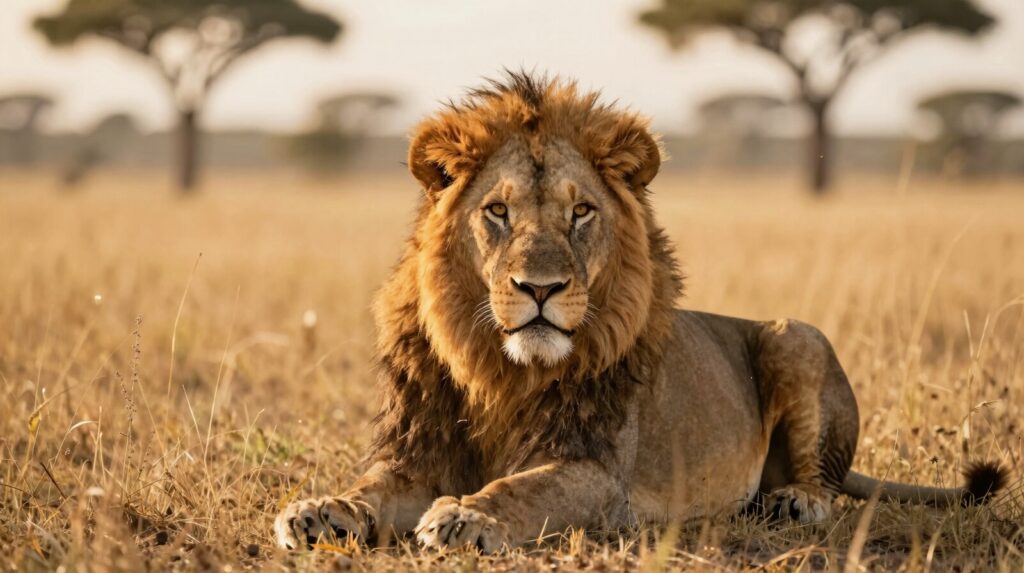Lion adaptations such as muscular bodies, powerful jaws, retractable claws, night vision, social hunting strategies, and territorial behavior. These traits allow them to take down large prey efficiently and thrive in savannas, grasslands, and semi-arid regions.
As you step into the kingdom of the African savannah, you’ll find that lions have sharpened both their physical prowess and cunning behaviors to reign supreme in their habitat. Their adaptations, a blend of finesse and strategy, have enabled them to navigate the challenges of their environment with remarkable dexterity.
As an ecologist I love observing how they move and how they communicate. Lions have honed a unique set of traits that make them formidable predators. But what lies beneath their majestic exterior? Let’s unravel the mysteries of how these iconic creatures have evolved to become the rulers of the plains.
Physical Adaptations of Lions
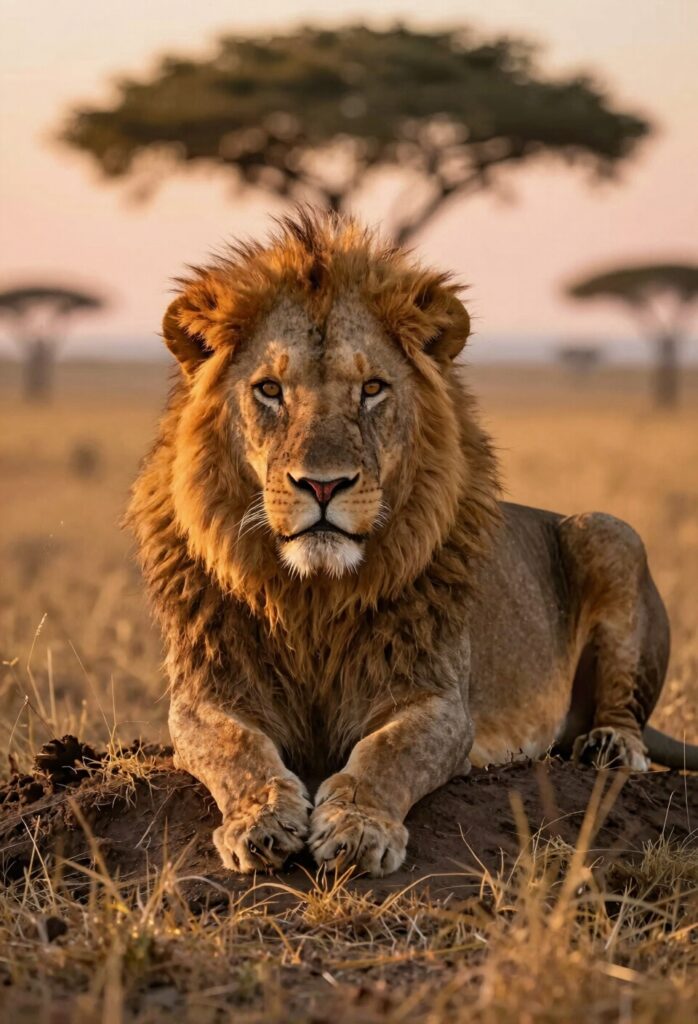
Lions have evolved unique physical features to thrive in their savannah habitat. One key adaptation is their muscular bodies, aiding in powerful movements during hunting and defending their territory. Their sharp claws are retractable, allowing for stealthy approaches and efficient grip while taking down prey. Lions’ strong jaws and sharp teeth are essential for tearing flesh and consuming their meals, showcasing their role as apex predators in the savannah ecosystem. Additionally, their rough tongues help them efficiently clean meat off bones, ensuring no food goes to waste.
Moreover, lions’ iconic manes serve as both protection and a display of dominance. The manes shield their necks during fights, reducing the risk of injury, while also signaling strength to potential rivals. This physical feature is more prominent in males, symbolizing their maturity and ability to lead within the pride. Overall, these physical adaptations have been honed over generations, allowing lions to excel in their natural habitat.
Behavioral Adaptations of Lions
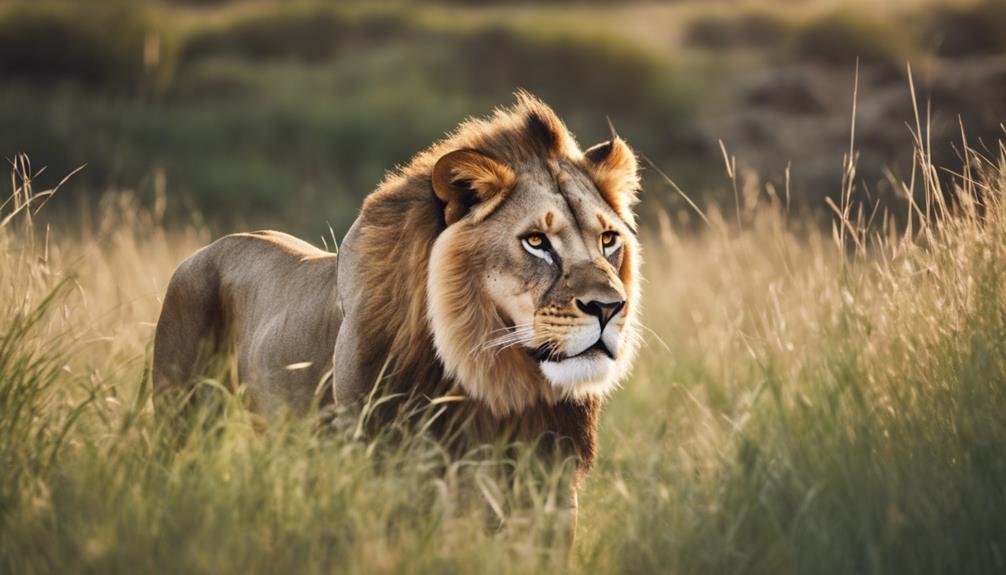
With their social structure deeply rooted in prides, lions exhibit remarkable behavioral adaptations that contribute to their survival and success in the savannah ecosystem. Lions showcase cooperative hunting behavior, where they work together to take down large prey. This teamwork increases their efficiency and success rates in capturing food.
Additionally, lions display strategic behavior by utilizing a division of labor within the pride. While lionesses primarily focus on hunting, males often protect the territory and young cubs. This specialization allows each group member to contribute effectively to the overall well-being of the pride.
Moreover, lions demonstrate strong social bonds through grooming rituals and vocal communication. These interactions help strengthen relationships within the pride, promoting unity and cooperation. Lions also exhibit territorial behavior, marking their territories with scent to establish boundaries and defend against intruders.
Evolution of Lion Adaptations
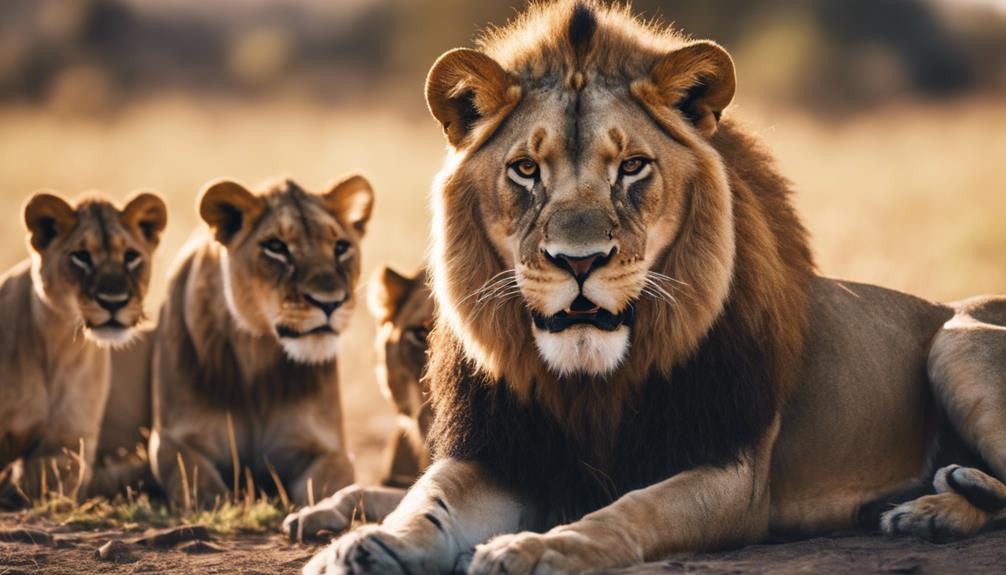
Demonstrating remarkable behavioral adaptations rooted in their social structure, lions have evolved over time to thrive in the savannah ecosystem. The evolution of lion adaptations has been a gradual process shaped by the challenges of their environment. Lions have developed physical characteristics such as powerful jaws and sharp teeth for hunting and feeding on prey. Their social structure, living in prides with defined roles, has also played an important role in their evolution. Through cooperative hunting and communal care for the young, lions have increased their chances of survival in the competitive savannah landscape.
Furthermore, over thousands of years, lions have honed their hunting techniques and communication skills to become efficient predators. The ability to work together in coordinated attacks has been a key evolutionary advantage for lions. As they continue to adapt to changes in their habitat, lions may develop additional strategies to secure their ongoing success in the wild.
Survival Skills of Lion Cubs
Developing key survival skills from a young age, lion cubs learn essential hunting techniques under the guidance of their mothers. Cubs observe and imitate their mothers during hunts, gradually honing their stalking and pouncing abilities. Through playful interactions with siblings, cubs refine their coordination and agility, vital for successful hunts in the future.
Lion cubs also learn about the social dynamics within the pride. They understand their place in the hierarchy, respecting older members and learning to cooperate with their siblings during mealtimes and territorial disputes. These early lessons in social behavior help guarantee the cub’s integration and acceptance within the pride.
Moreover, lion mothers instill discipline in their cubs, teaching them patience and perseverance during hunts. Cubs that exhibit curiosity and quick learning are often rewarded with successful catches, reinforcing positive behaviors. These survival skills acquired during the developmental stages are essential for the cubs’ future as they grow into independent hunters within the pride.
Ongoing Adaptations in Lions
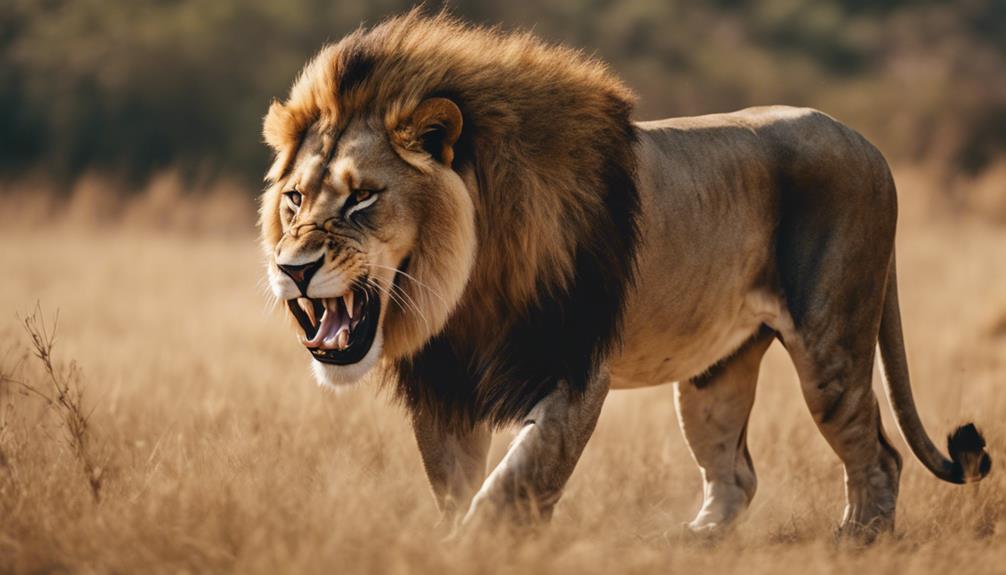
Lions in the savannah continually evolve their physical and behavioral traits to adapt to the changing environment and secure their survival. These ongoing adaptations are important for their continued existence in the wild. As the environment shifts, lions must adjust to new challenges such as climate variations, changes in prey availability, and human encroachment.
One notable ongoing adaptation in lions is their ability to learn and pass down survival skills through generations. Lionesses play a crucial role in teaching their cubs how to hunt and survive in the harsh savannah landscape. Cubs observe and learn from their mothers, honing their hunting skills from a young age. This transmission of knowledge ensures that each new generation of lions is equipped to thrive in their habitat.
Moreover, lions may be developing new strategies and behaviors to cope with modern threats. Human activities, habitat loss, and climate change present unprecedented challenges, pushing lions to adapt in innovative ways to secure their place in the ecosystem. By continuously evolving, lions increase their chances of survival in a rapidly changing world.
Implications of Lion Adaptations
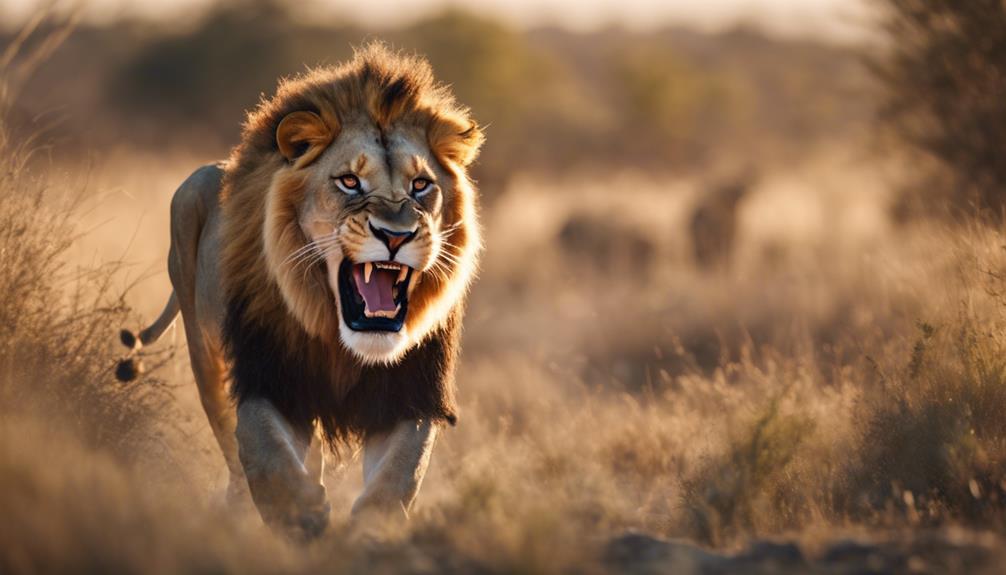
Considering the evolutionary journey of lions and their adaptive prowess, it’s evident that the implications of these adaptations extend far beyond mere survival in the African savannah. Lions’ adaptations not only guarantee their survival but also play a pivotal role in maintaining the delicate balance of the ecosystem. By honing their hunting skills and social structures over generations, lions contribute to controlling herbivore populations, preventing overgrazing, and ultimately supporting the diversity of plant life in their habitat.
Additionally, the adaptations of lions showcase the intricate relationship between physical traits and behavioral patterns. Lions’ ability to work together in prides, communicate effectively through vocalizations, and coordinate hunts demonstrates the importance of social bonds in their success. These adaptations highlight the significance of cooperation and coordination in the wild, emphasizing the interconnectedness of all living organisms in the African savannah. Lions’ adaptations not only shape their own survival but also influence the dynamics of the entire ecosystem they inhabit.

Erzsebet Frey (Eli Frey) is an ecologist and online entrepreneur with a Master of Science in Ecology from the University of Belgrade. Originally from Serbia, she has lived in Sri Lanka since 2017. Eli has worked internationally in countries like Oman, Brazil, Germany, and Sri Lanka. In 2018, she expanded into SEO and blogging, completing courses from UC Davis and Edinburgh. Eli has founded multiple websites focused on biology, ecology, environmental science, sustainable and simple living, and outdoor activities. She enjoys creating nature and simple living videos on YouTube and participates in speleology, diving, and hiking.
🌿 Explore the Wild Side!
Discover eBooks, guides, templates and stylish wildlife-themed T-shirts, notebooks, scrunchies, bandanas, and tote bags. Perfect for nature lovers and wildlife enthusiasts!
Visit My Shop →
